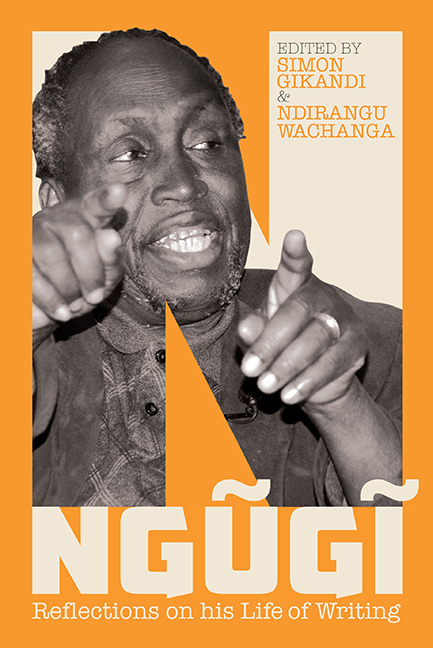Book contents
- Frontmatter
- Contents
- Preface
- Acknowledgements
- Chronology
- Photographic Section
- Introduction: Ngũgĩ wa Thiong'o: Reflections on His Life of Writing
- Ngũgĩ at Work
- Part I Serenades & Beginnings
- Part II Memories, Recollections & Tributes
- Part III Working with Ngũgĩ
- 19 Ngũgĩ & the Decolonization of Publishing
- 20 The Turning Point: Ngũgĩ wa Thiong'o & His Kenyan Publisher
- 21 Working with Ngũgĩ
- 22 Recollections of Mũtiiri
- Part IV The Writer, the Critic & the World
- Part V The Other Ngũgĩ
- Appendixes
- References
- Bibliography of Ngũgĩ's Primary Works
- Works Cited
- Notes on Contributors
- Index
21 - Working with Ngũgĩ
from Part III - Working with Ngũgĩ
Published online by Cambridge University Press: 27 July 2019
- Frontmatter
- Contents
- Preface
- Acknowledgements
- Chronology
- Photographic Section
- Introduction: Ngũgĩ wa Thiong'o: Reflections on His Life of Writing
- Ngũgĩ at Work
- Part I Serenades & Beginnings
- Part II Memories, Recollections & Tributes
- Part III Working with Ngũgĩ
- 19 Ngũgĩ & the Decolonization of Publishing
- 20 The Turning Point: Ngũgĩ wa Thiong'o & His Kenyan Publisher
- 21 Working with Ngũgĩ
- 22 Recollections of Mũtiiri
- Part IV The Writer, the Critic & the World
- Part V The Other Ngũgĩ
- Appendixes
- References
- Bibliography of Ngũgĩ's Primary Works
- Works Cited
- Notes on Contributors
- Index
Summary
In 1977, I was invited by Ngũgĩ to join him in the production of Ngaahika Ndeenda at Kamĩrĩĩthũ, his home village. At that time I knew very little about the history of Kenya other than the text book school versions and even less about viewing the history from the point of the majority of Kenyans who are the peasants and workers. Fresh from Europe, I was a starry eyed young man eager to engage with ‘African culture’ and particularly the culture of the ‘grassroots’ ethnicities of Kenya, my place of birth.
I was a junior researcher at the Institute of African Studies, University of Nairobi and out in the field a lot working on material culture. It was in the field that my eyes opened up to the atrocities of the Kenyatta regime and the gruesome poverty experienced by many Kenyans. I used to cross over to the Northern Frontier District (NFD) military zone where no journalist was allowed, and I saw places where there were Mau Mau type concentration camps. I witnessed humiliation of the rural citizens by the regime's forces and the administration. I saw that the pogroms against the intellectuals that followed both the performance of Ngaahika Ndeenda and Maitũ Njugĩra and the detentions and exiles were not different from those in the rural north of Kenya and later among the Pokot and Turkana peoples. In the city where I lived, I saw police brutality waged on students and passers-by. This was the reality of the non-elites in everyday Kenya. These sights made a tremendous impact on me and gradually I began to understand what Ngũgĩ was saying, why the regime needed to be confronted, and how he was doing it. Ngũgĩ addressed the peasant farmers, students and workers from around like those from the Bata shoe factory. He addressed them in their own language and music. Poverty was the context and dictatorship the reason for the risk of taking Ngaahika Ndeenda and later Maitũ Njugĩra to the public forum.
I began reading about the Mau Mau.
- Type
- Chapter
- Information
- NgugiReflections on his Life of Writing, pp. 121 - 124Publisher: Boydell & BrewerPrint publication year: 2018



